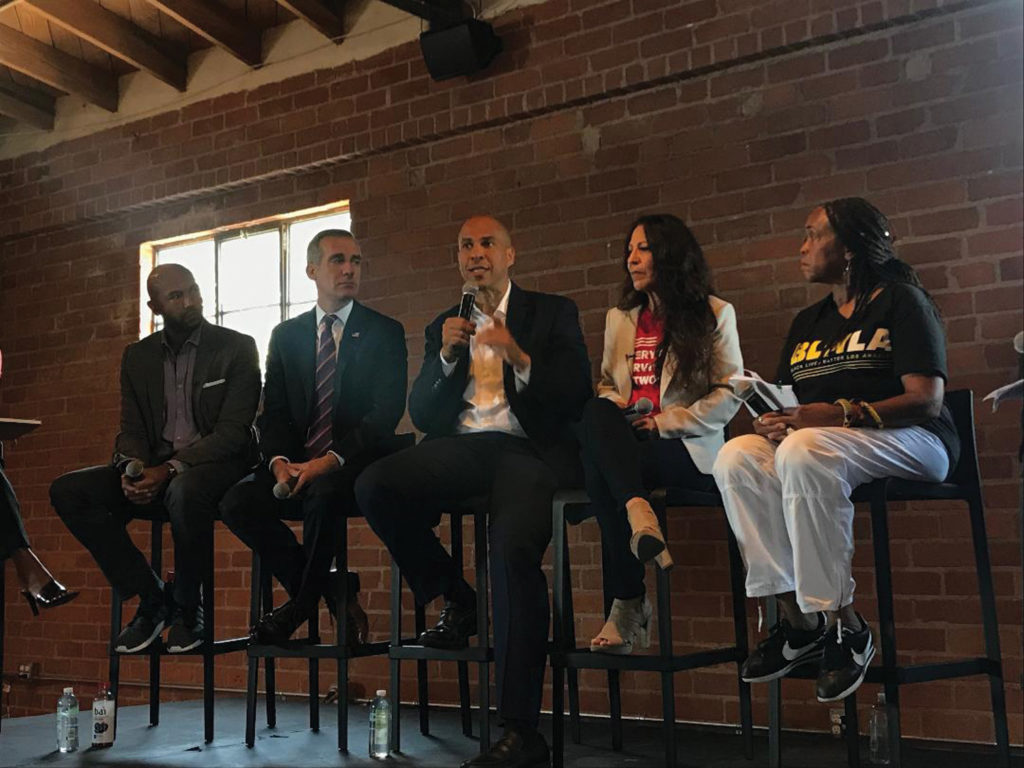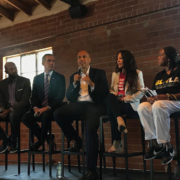
IF there was one singular political issue that has defined the 2010s for America, it’s guns. Mass shootings in schools, churches, movie theaters and supermarkets have frequently ignited national conversations on whether or not firearms, particularly assault weapons, should be more strictly regulated by the government, if not banned.
Along with the zeitgeist-defining issues of police brutality and racial profiling, the broader issue of gun violence has escalated into one of the most pressing divisive issues in the country, making the conversation on gun control vs. gun rights as polarizing as the issue of abortion.
At the forefront of this issue is Democratic Sen. Cory Booker of New Jersey, who has spent the better part of the decade fighting for “common sense gun reform” on the Senate floor and fighting the formidable influence of the National Rifle Association (NRA) on Capitol Hill. Booker is among the candidates running for the Democratic presidential nomination who has vowed to take down the gun lobby and impose stricter regulations on the sale of firearms to the public.
While campaigning in California, Booker sat down with Los Angeles Mayor Eric Garcetti, the pro-gun control organization Moms Demand Action and Black Lives Matter in a roundtable talk in Los Angeles on Thursday, 22 that centered around gun violence in America: its traumatic effects, the importance of accountability and, most crucially, how to prevent and stop the proliferation of mass shootings.
Booker said that he vows to “awaken this sense of urgency because this has to be a movement and a movement to do what we organize governments to do which is to protect our citizenry.”
In May, Booker unveiled a sweeping 14-point gun control plan that would, among other things, establish a licensing program in which individuals must obtain a five-year license in order to purchase and own a firearm. (Booker’s home state of New Jersey is one of nine states that currently requires a license or permit for certain firearms.)
The plan also proposes to ban assault weapons, high-capacity magazines and bump stocks, increase oversight on gun manufacturers and close loopholes that allow individuals on the federal terror watch list to purchase guns. Booker’s plan reflects many of the similar gun control initiatives promoted by other Democrats, including a Democratic bill passed in the House on universal background checks.
Opponents of gun control who advocate for the right to own firearms without the strict regulations proposed by Democrats have criticized plans like Booker’s for a perceived infringement on their constitutional right to bear arms.
Republicans have criticized these ideas for lack of feasibility as well as measures that simply are not needed. President Donald Trump this week claimed that the U.S. has “very strong background checks” and suggested that every gun sale requires a background check, which isn’t true. (Twelve states, including California, impose background checks, but since it’s not federal law, many states don’t conduct them.)
“How this is framed by the NRA as common sense ridiculous. With cars, we don’t say, ‘You don’t have to get a license to own and operate a car.’ We as a government say for cars, which are dangerous, too, you have to get trained and be approved and licensed by the government. Why we have that fear when it comes to guns is absolutely rational,” Garcetti said, praising Booker’s efforts on the hill to curb the NRA’s influence on gun laws in the U.S.
According to the nonprofit organization Everytown for Gun Safety, there are 36,383 gun deaths by intent every year in the United States as well as 100,120 injuries. Most recently, the shootings in El Paso, Texas and Dayton, Ohio, which occurred within less than 24 hours apart, claimed the lives of 31 people in total.
According to data from the FBI, Statistics Canada, Australia Crime Statistics and the Homicide Index Home Office, 73% of all homicides in the U.S. were gun-related in 2017; for perspective, England and Wales’ gun-related homicide rate was 3% in 2017 and 2018, Canada’s was 38% in 2018 and Australia’s was 13% in 2013 and 2014.
In the case of gun violence, the political gridlock on gun laws has defined the current state of American politics, forming a clear ideological line on an issue that has become more politicized as presidential administrations changed and as weapons became more sophisticated.
But the issue isn’t solely about guns but also about the culture of America that has bred violence among many communities across the country. Booker still lives in the Central Ward of Newark, a neighborhood historically plagued by gang violence, and he has said that he still hears gunshots from his home.
“The path to violence often looks like a public health problem. Cities like Newark, Los Angeles and Oakland are doing things to not only get guns off the streets but also to invest in the communities that are impacted by the violence and by doing the things we know will prevent violence,” Booker said.
As the mayor of Newark, he focused on providing economic resources to education programs, after-school programs and outreach initiatives to build relationships between community leaders and neighborhoods impacted by gun violence.
Booker recognizes the solutions on the sweeping issue of gun violence won’t happen overnight, but he urges Americans to not become desensitized to news of mass shootings and, instead, understand that it is an issue to be solved.
“We’re seeing a capitulation to fear. It should be so unacceptable to Americans that we’re about to send children back to school, and in the strongest nation on the planet Earth, and we’re telling them that we can’t protect you, so we’re going to teach you in school how to hide or how to shelter in place [in the event of a school shooting],” Booker said. “That’s what this has got to be about. Awakening a movement in this country for us to protect ourselves and reclaim American freedom: freedom from fear, freedom from violence, freedom from this trauma that hits millions of Americans in this country, and not just those who lose their lives, but the families, communities and the lives that are shattered by gun violence every single day.”






